Charles E W Bean, Diaries, AWM38 3DRL 606/116/1 - June - September 1918 - Part 5
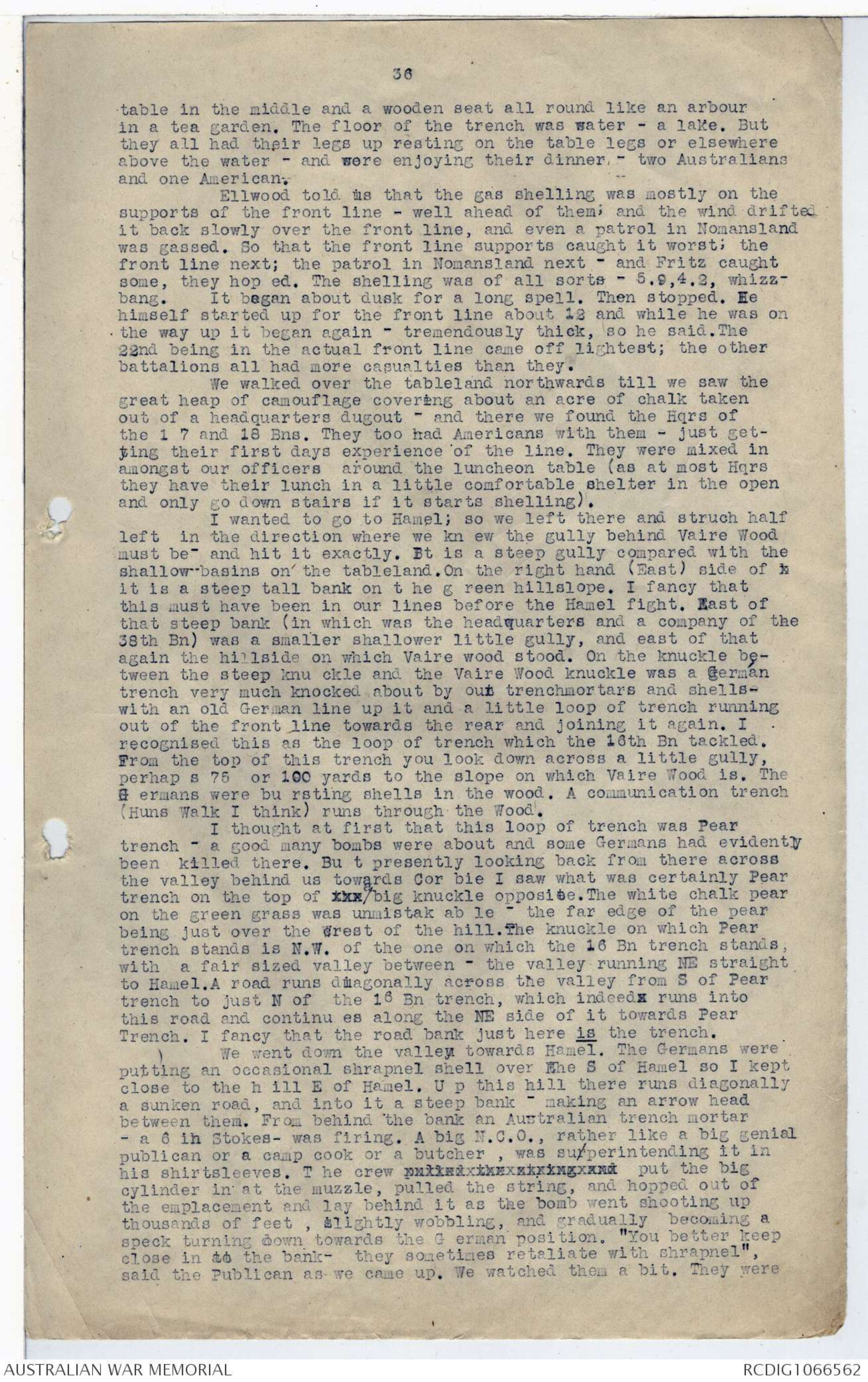
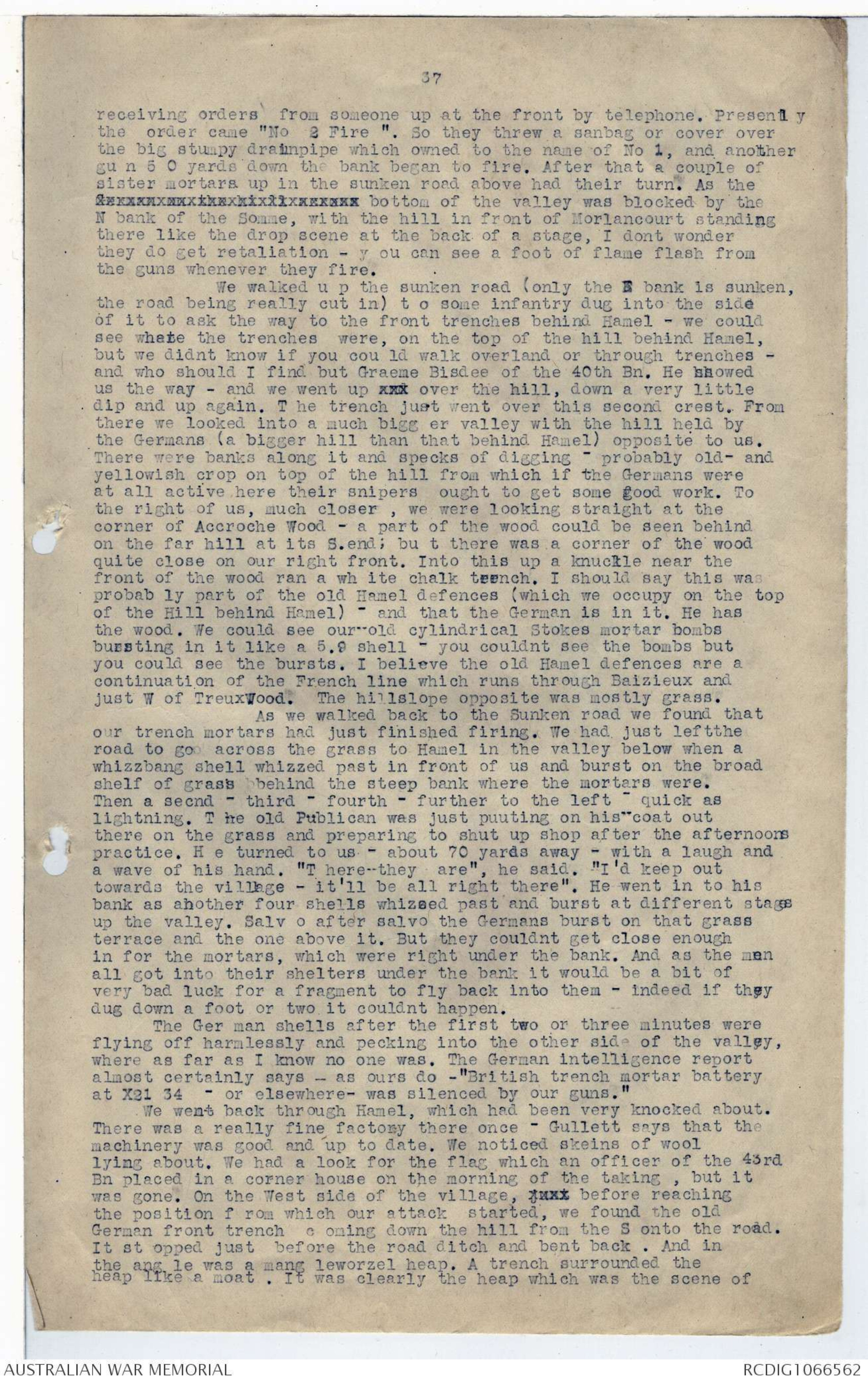
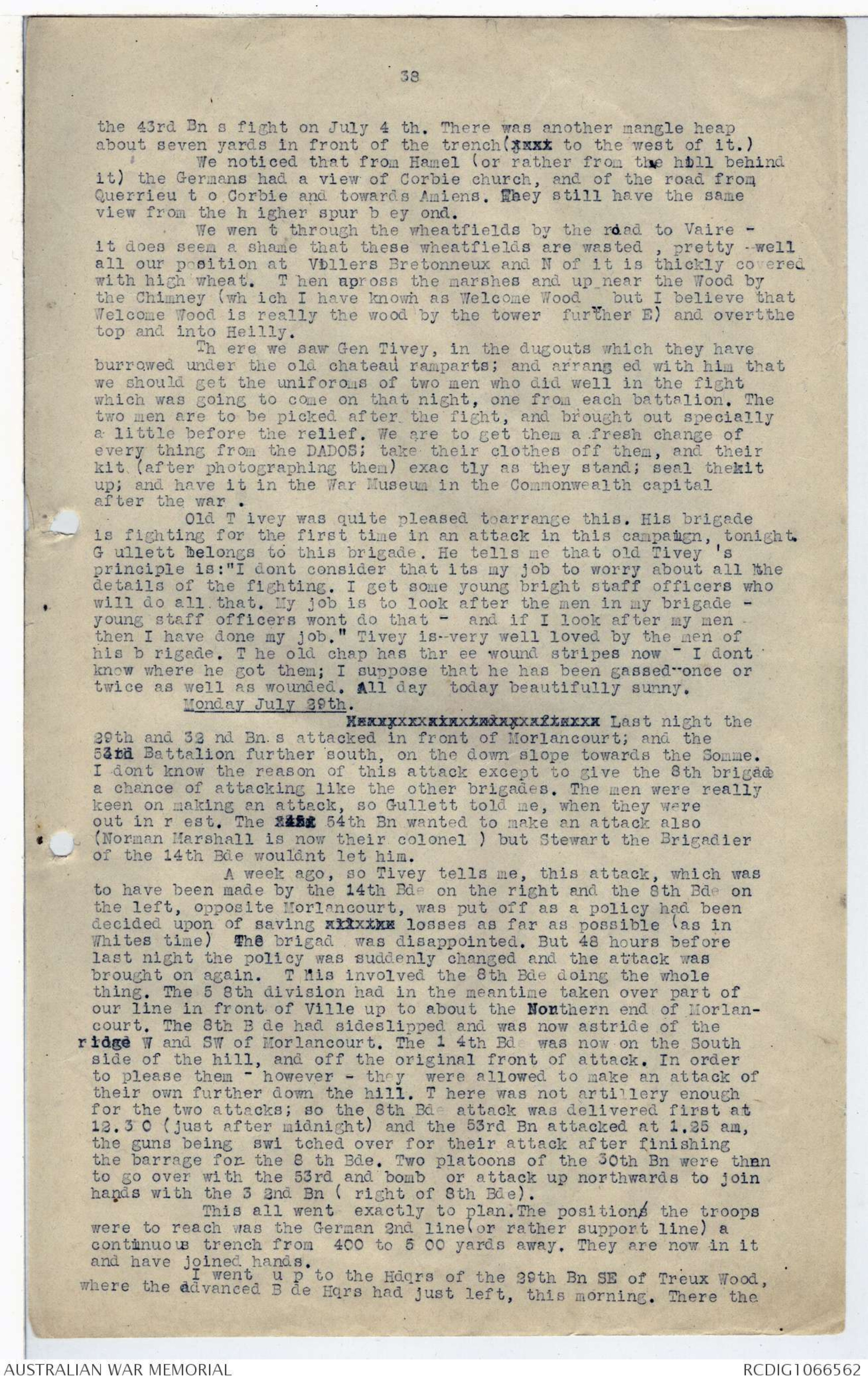
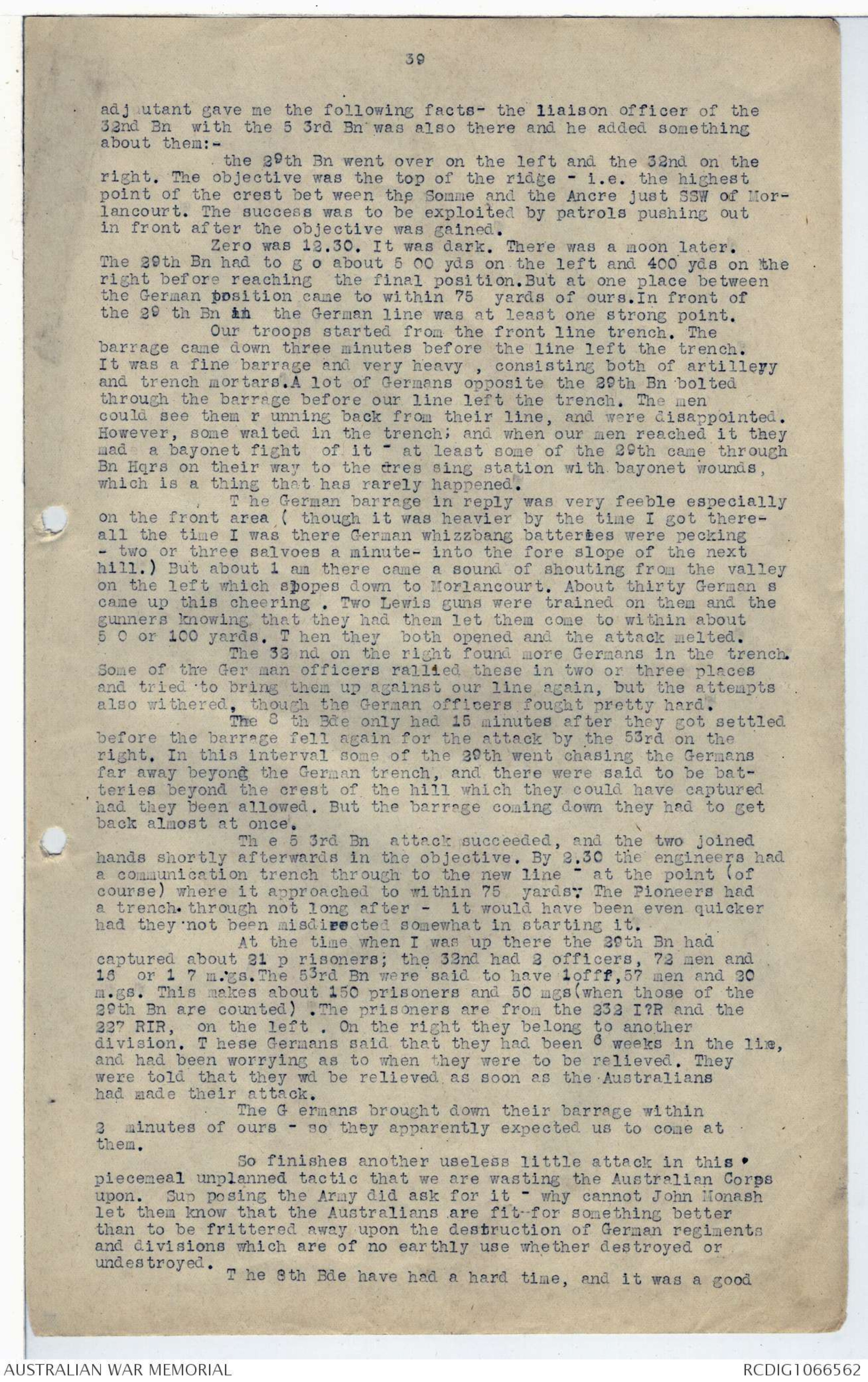
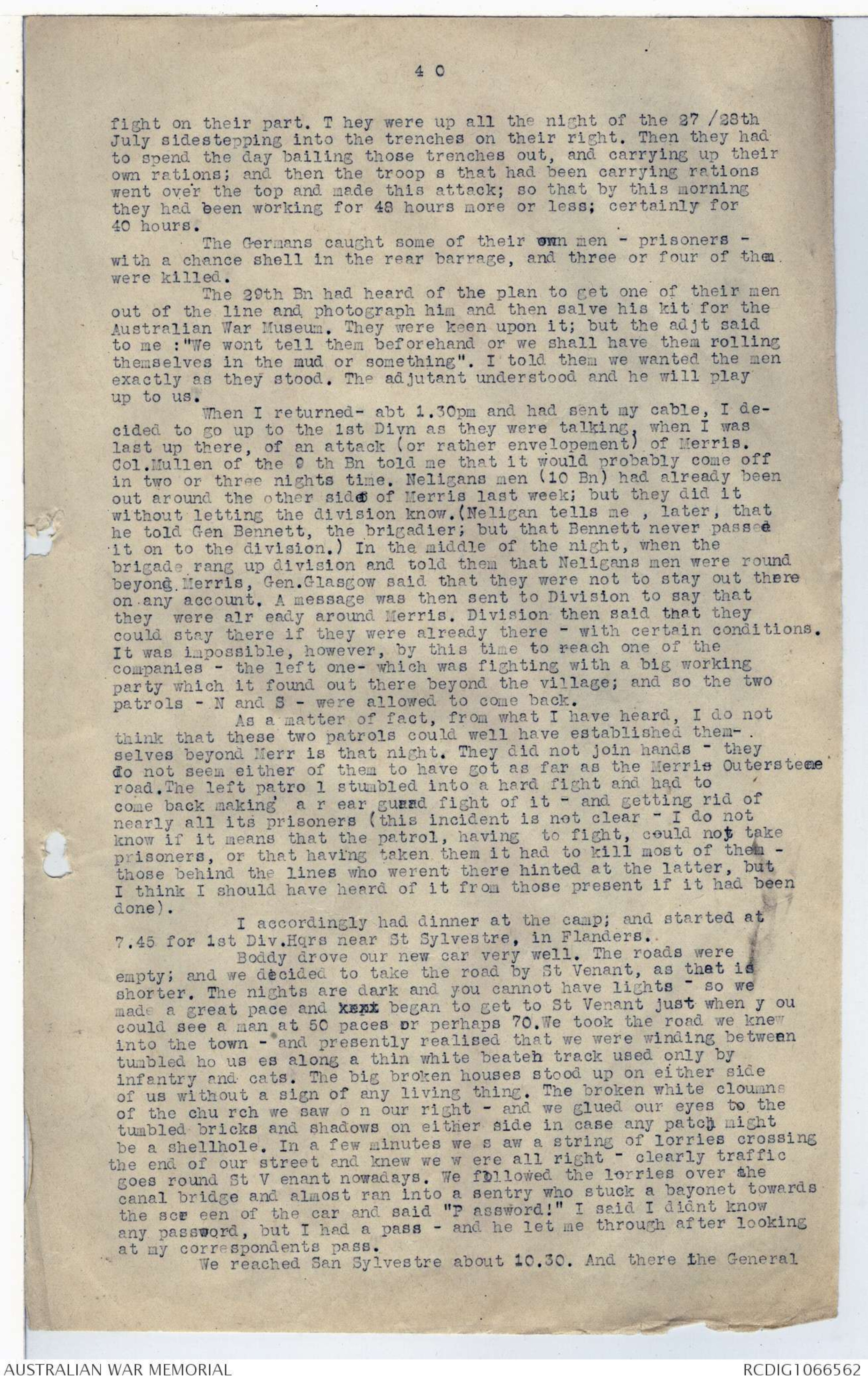
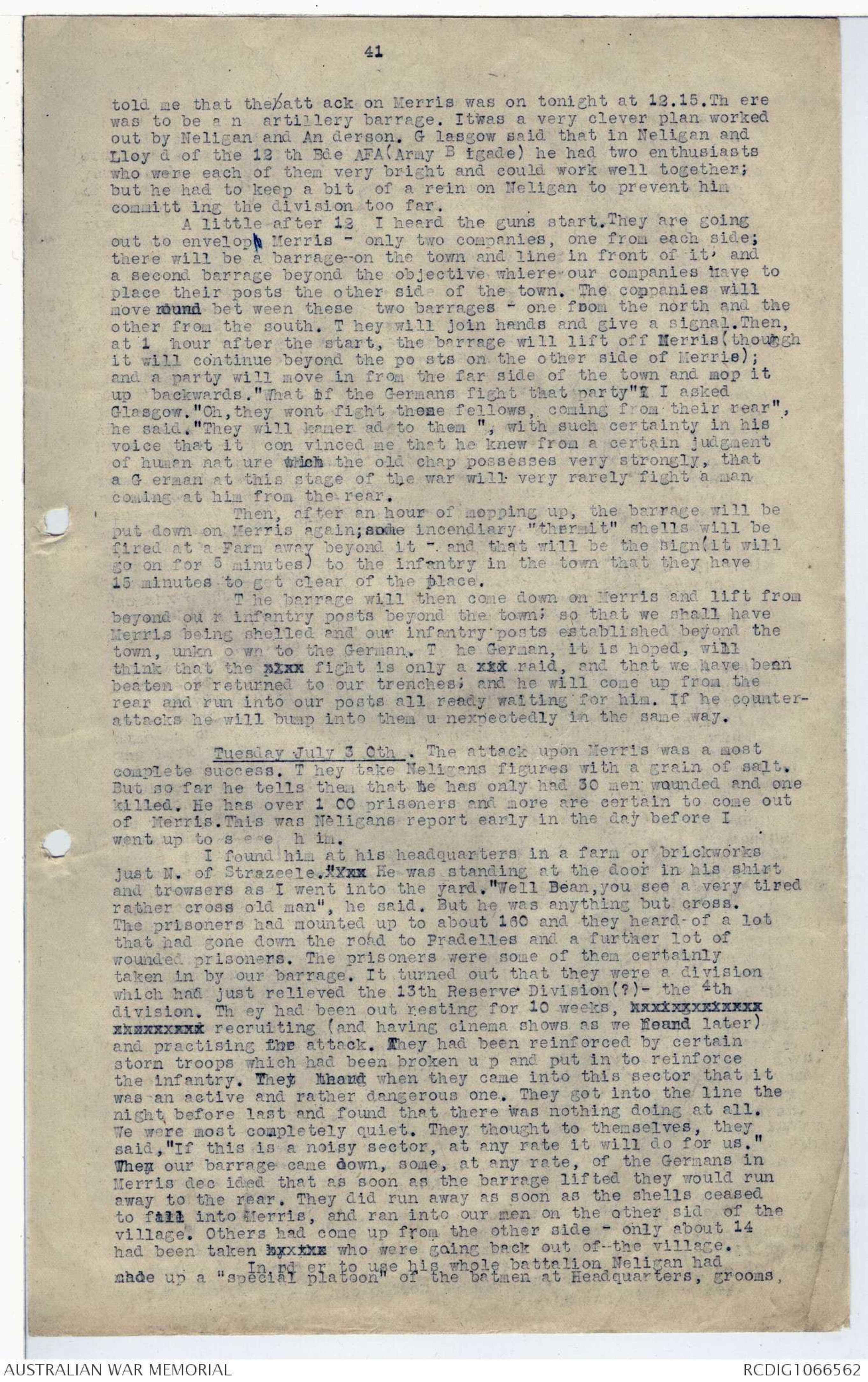
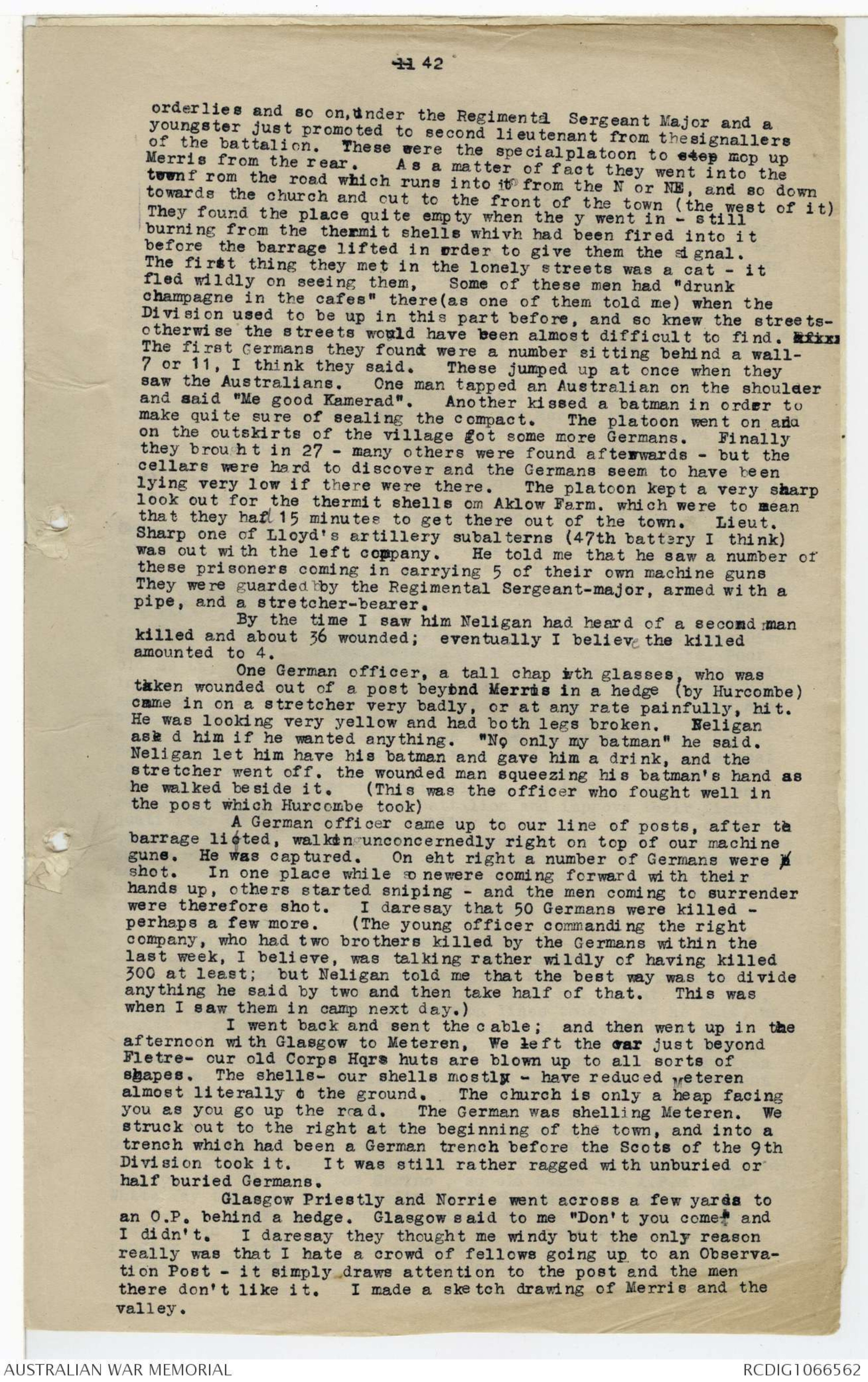
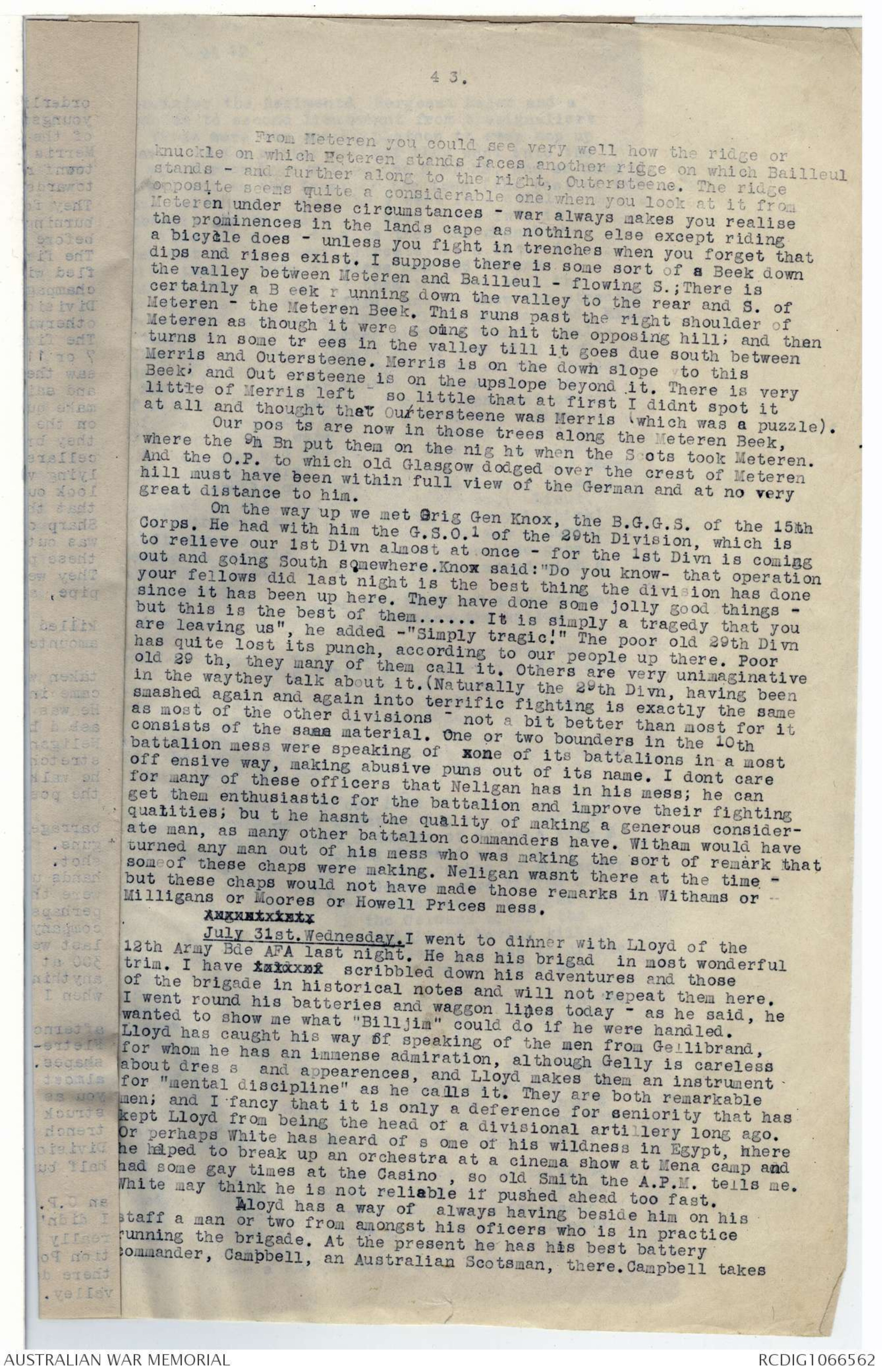
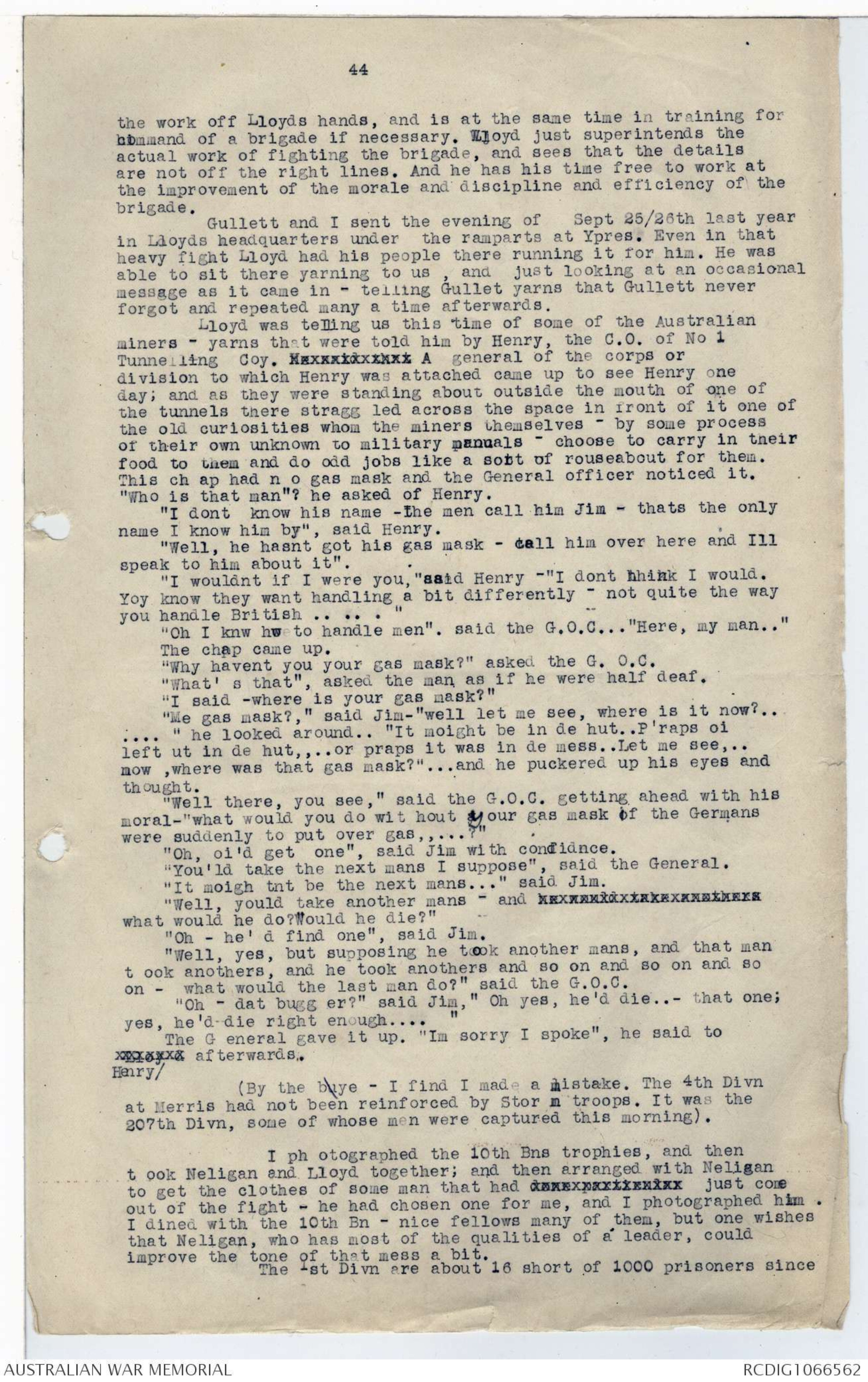
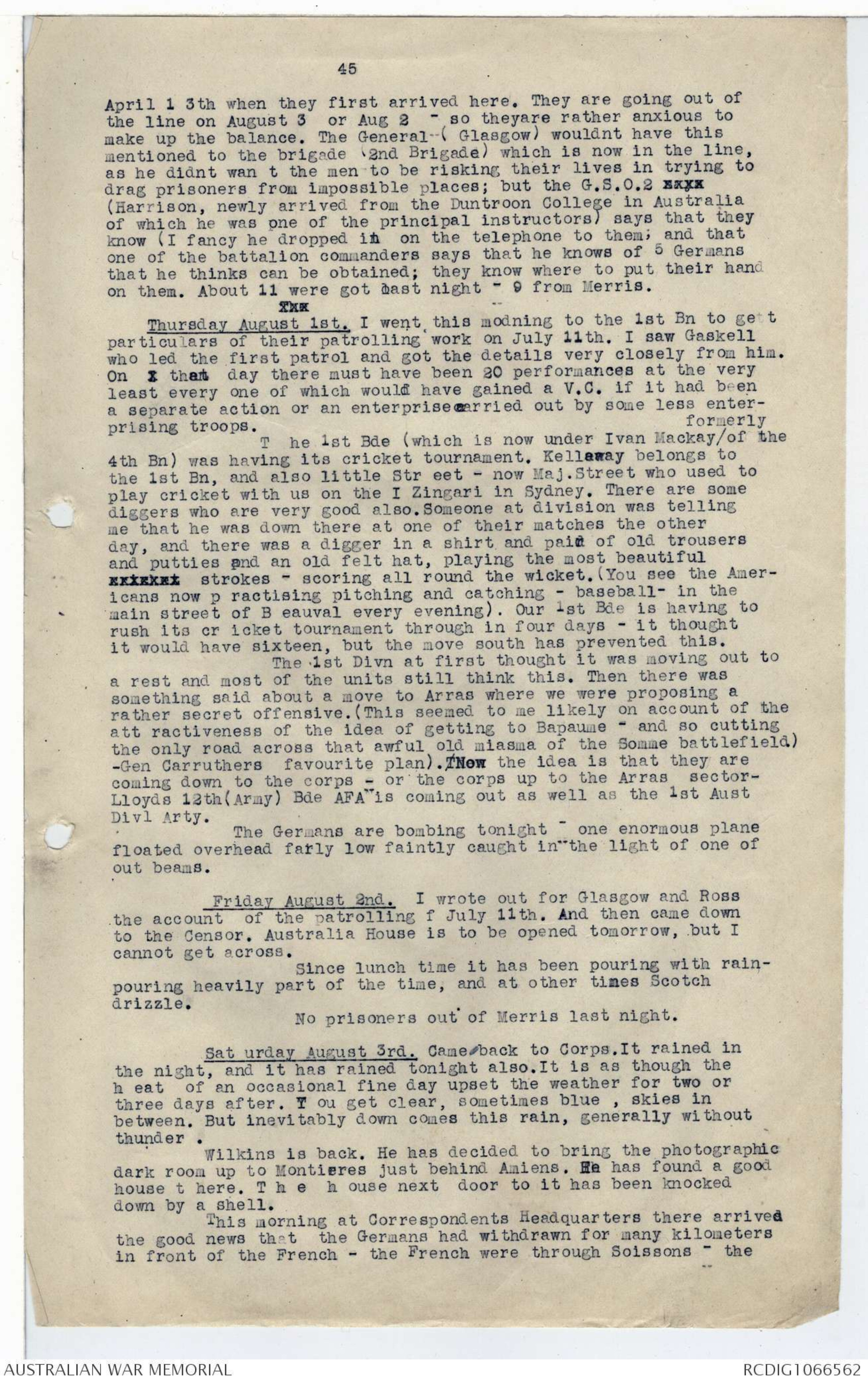
36
table in the middle and a wooden seat all round like an arbour
in a tea garden. The floor of the trench was water - a lake. But
they all had their legs up resting on the table legs or elsewhere
above the water - and were enjoying their dinner, two Australians
and one American.
Ellwood told us that the gas shelling was mostly on the
supports of the front line - well ahead of them; and the wind drifted
it back slowly over the front line, and even a patrol in Nomansland
was gassed. So that the front line supports caught it worst; the
front line next; the patrol in Nomansland next - and Fritz caught
some, they hop ed. The shelling was of all sorts - 5.9,4.2, whizz-bang.
It began about dusk for a long spell. Then stopped. He
himself started up for the front line about 12 and while he was on
the way up it began again - tremendously thick, so he said. The
22nd being in the actual front line came off lightest; the other
battalions all had more casualties than they.
We walked over the tableland northwards till we saw the
great heap of camouflage covering about an acre of chalk taken
out of a headquarters dugout - and there we found the Hqrs of
the 1 7 and 18 Bns. They too had Americans with them - just getting
their first days experience of the line. They were mixed in
amongst our officers around the luncheon table (as at most Hqrs
they have their lunch in a little comfortable shelter in the open
and only go down stairs if it starts shelling).
I wanted to go to Hamel; so we left there and struch half
left in the direction where we kn ew the gully behind Vaire Wood
must be- and hit it exactly. Bt is a steep gully compared with the
shallow--basins on the tableland. On the right hand (East) side of x
it is a steep tall bank on t he g reen hillslope. I fancy that
this must have been in our lines before the Hamel fight. East of
that steep bank (in which was the headquarters and a company of the
38th Bn) was a smaller shallower little gully, and east of that
again the hillside on which Vaire wood stood. On the knuckle between
the steep knu ckle and the Vaire Wood knuckle was a German
trench very much knocked about by our trenchmortars and shells-
with an old German line up it and a little loop of trench running
out of the front line towards the rear and joining it again. I
recognised this as the loop of trench which the 16th Bn tackled.
From the top of this trench you look down across a little gully,
perhap s 75 or 100 yards to the slope on which Vaire Wood is. The
G ermans were bu rsting shells in the wood. A communication trench
(Huns Walk I think) runs through the Wood.
I thought at first that this loop of trench was Pear
trench - a good many bombs were about and some Germans had evidently
been killed there. Bu t presently looking back from there across
the valley behind us towards Cor bie I saw what was certainly Pear
trench on the top of XXX ^a big knuckle opposite. The white chalk pear
on the green grass was unmistak ab le - the far edge of the pear
being just over the crest of the hill. The knuckle on which Pear
trench stands is N.W. of the one on which the 16 Bn trench stands,
with a fair sized valley between - the valley running NE straight
to Hamel. A road runs diagonally across the valley from S of Pear
trench to just N of the 16 Bn trench, which indeedx runs into
this road and continu es along the NE side of it towards Pear
Trench. I fancy that the road bank just here is the trench.
We went down the valley towards Hamel. The Germans were
putting an occasional shrapnel shell over The S of Hamel so I kept
close to the h ill E of Hamel. U p this hill there runs diagonally
a sunken road, and into it a steep bank - making an arrow head
between them. From behind the bank an Australian trench mortar
- a 6 in Stokes- was firing. A big N.C.O., rather like a big genial
publican or a camp cook or a butcher , was surperintending it in
his shirtsleeves. T he crew xxxxxxxxxxxxxxxxxxxxx put the big
cylinder in at the muzzle, pulled the string, and hopped out of
the emplacement and lay behind it as the bomb went shooting up
thousands of feet , slightly wobbling, and gradually becoming a
speck turning down towards the G erman position. "You better keep
close in to the bank- they sometimes retaliate with shrapnel",
said the Publican as we came up. We watched them a bit. They were
37
receiving orders from someone up at the front by telephone. Presentl y
the order came "No 2 Fire". So they threw a sanbag or cover over
the big stumpy drainpipe which owned to the name of No 1, and another
gu n 5 0 yards down the bank began to fire. After that a couple of
sister mortars up in the sunken road above had their turn. As thexxxxxxxxxxxxxxxxxxxxxxxxxx bottom of the valley was blocked by the
N bank of the Somme, with the hill in front of Morlancourt standing
there like the drop scene at the back of a stage, I dont wonder
they do get retaliation - y ou can see a foot of flame flash from
the guns whenever they fire.
We walked u p the sunken road (only the E bank is sunken,
the road being really cut in) t o some infantry dug into the side
of it to ask the way to the front trenches behind Hamel - we could
see where the trenches were, on the top of the hill behind Hamel,
but we didnt know if you cou ld walk overland or through trenches -
and who should I find but Graeme Bisdee of the 40th Bn. He showed
us the way - and we went up xxx over the hill, down a very little
dip and up again. T he trench just went over this second crest. From
there we looked into a much bigg er valley with the hill held by
the Germans (a bigger hill than that behind Hamel) opposite to us.
There were banks along it and specks of digging - probably old- and
yellowish crop on top of the hill from which if the Germans were
at all active here their snipers ought to get some good work. To
the right of us, much closer, we were looking straight at the
corner of Accroche Wood - a part of the wood could be seen behind
on the far hill at its S.end; bu t there was a corner of the wood
quite close on our right front. Into this up a knuckle near the
front of the wood ran a wh ite chalk trench. I should say this was
probab ly part of the old Hamel defences (which we occupy on the top
of the Hill behind Hamel) - and that the German is in it. He has
the wood. We could see our-- old cylindrical Stokes mortar bombs
bursting in it like a 5.9 shell - you couldnt see the bombs but
you could see the bursts. I believe the old Hamel defences are a
continuation of the French line which runs through Baizieux and
just W of TreuxWood. The hillslope opposite was mostly grass.
As we walked back to the Sunken road we found that
our trench mortars had just finished firing. We had just leftthe
road to go across the grass to Hamel in the valley below when a
whizzbang shell whizzed past in front of us and burst on the broad
shelf of grass bbehind the steep bank where the mortars were.
Then a secnd - third - fourth - further to the left -quick as
lightning. T he old Publican was just puuting on his .. coat out
there on the grass and preparing to shut up shop after the afternoons
practice. H e turned to us - about 70 yards away - with a laugh and
a wave of his hand. "T here .. they are", he said. "I 'd keep out
towards the village - it'll be all right there". He went in to his
bank as another four shells whizzed past and burst at different stages
up the valley. Salv o after salvo the Germans burst on that grass
terrace and the one above it. But they couldnt get close enough
in for the mortars, which were right under the bank. And as the men
all got into their shelters under the bank it would be a bit of
very bad luck for a fragment to fly back into them - indeed if they
dug down a foot or two it couldnt happen.
The Ger man shells after the first two or three minutes were
flying off harmlessly and pecking into the other side of the valley,
where as far as I know no one was. The German intelligence report
almost certainly says - as ours do -"British trench mortar battery
at X21 34 - or elsewhere- was silenced by our guns."
We went back through Hamel, which had been very knocked about.
There was a really fine factory there once - Gullett says that the
machinery was good and up to date. We noticed skeins of wool
lying about. We had a look for the flag which an officer of the 43rd
Bn placed in a corner house on the morning of the taking, but it
was gone. On the West side of the village, xxxx before reaching
the position f rom which our attack started, we found the old
German front trench, c oming down the hill from the S onto the road.
It st opped just before the road ditch and bent back. And in
the ang le was a mang leworzel heap. A trench surrounded the
heap like a moat. It was clearly the heap which was the scene of
38
the 43rd Bn s fight on July 4 th. There was another mangle heap
about seven yards in front of the trench (xxxx to the west of it.)
We noticed that from Hamel (or rather from the hill behind
it) the Germans had a view of Corbie church, and of the road from
Querrieu t o Corbie and towards Amiens. They still have the same
view from the h igher spur b ey ond.
We wen t through the wheatfields by the road to Vaire -
it does seem a shame that these wheatfields are wasted, pretty well
all our position at Villers Bretonneux and N of it is thickly covered
with high wheat. T hen across the marshes and up near the Wood by
the Chimney (wh ich I have known as Welcome Wood but I believe that
Welcome Wood is really the wood by the tower, further E) and overtthe
top and into Heilly.
Th ere we saw Gen Tivey, in the dugouts which they have
burrowed under the old chateau ramparts; and arrang ed with him that
we should get the uniforoms of two men who did well in the fight
which was going to come on that night, one from each battalion. The
two men are to be picked after the fight, and brought out specially
a little before the relief. We are to get them a fresh change of
every thing from the DADOS: take their clothes off them, and their
kit (after photographing them) exac tly as they stand; seal thekit
up; and have it in the War Museum in the Commonwealth capital
after the war.
Old T ivey was quite pleased toarrange this. His brigade
is fighting for the first time in an attack in this campaign, tonight.
G ullett belongs to this brigade. He tells me that old Tivey 's
principle is:"I dont consider that its my job to worry about all the
details of the fighting. I get some young bright staff officers who
will do all that. My job is to look after the men in my brigade -
young staff officers wont do that - and if I look after my men
then I have done my job." Tivey is--very well loved by the men of
his b rigade. T he old chap has thr ee wound stripes now - I dont
know where he got them; I suppose that he has been gassed -- once or
twice as well as wounded. All day today beautifully sunny.
Monday July 29thxxxxxxxxxxxxxxxxxxxxxxxxx Last night the
29th and 32 nd Bn. s attacked in front of Morlancourt; and the
53rd Battalion further south, on the down slope towards the Somme.
I dont know the reason of this attack except to give the 8th brigade
a chance of attacking like the other brigades. The men were really
keen on making an attack, so Gullett told me, when they were
out in r est. The xxxx 54th Bn wanted to make an attack also
(Norman Marshall is now their colonel) but Stewart the Brigadier
of the 14th Bde wouldnt let him.
A week ago, so Tivey tells me, this attack, which was
to have been made by the 14th Bde on the right and the 8th Bde on
the left, opposite Morlancourt, was put off as a policy had been
decided upon of saving xxxxxxx losses as far as possible (as in
Whites time) The brigad was disappointed. But 48 hours before
last night the policy was suddenly changed and the attack was
brought on again. T His involved the 8th Bde doing the whole
thing. The 5 8th division had in the meantime taken over part of
our line in front of Ville up to about the Northern end of Morlancourt.
The 8th B de had sideslipped and was now astride of the
ridge W and SW of Morlancourt. The 1 4th Bd, was now on the South
side of the hill, and off the original front of attack. In order
to please them - however - they, were allowed to make an attack of
their own further down the hill. T here was not artillery enough
for the two attacks; so the 8th Bde attack was delivered first at
12.30 (just after midnight) and the 53rd Bn attacked at 1.25 am,
the guns being swi tched over for their attack after finishing
the barrage for the 8 th Bde. Two platoons of the 30th Bn were then
to go over with the 53rd and bomb, or attack up northwards to join
hands with the 3 2nd Bn (right of 8th Bde).
This all went exactly to plan. The positions the troops
were to reach was the German 2nd line (or rather support line) a
continuous trench from 400 to 5 00 yards away. They are now in it
and have joined hands.
I went u p to the Hdqrs of the 29th Bn SE of Treux Wood,
where the advanced B de Hqrs had just left, this morning. There the
39
adj utant gave me the following facts- the liaison officer of the
32nd Bn with the 5 3rd Bn was also there and he added something
about them:-
the 29th Bn went over on the left and the 32nd on the
right. The objective was the top of the ridge - i.e. the highest
point of the crest bet ween the Somme and the Ancre just SSW of
Morlancourt. The success was to be exploited by patrols pushing out
in front after the objective was gained.
Zero was 12.30. It was dark. There was a moon later.
The 29th Bn had to g o about 5 00 yds on the left and 400 yds on the
right before reaching the final position. But at one place between
the German position came to within 75 yards of ours. In front of
the 29 th Bn in the German line was at least one strong point.
Our troops started from the front line trench. The
barrage came down three minutes before the line left the trench.
It was a fine barrage and very heavy, consisting both of artillery
and trench mortars.A lot of Germans opposite the 29th Bn bolted
through the barrage before our line left the trench. The men
could see them r unning back from their line, and were disappointed.
However, some waited in the trench; and when our men reached it they
mad a bayonet fight of it - at least some of the 29th came through
Bn Hqrs on their way to the dres sing station with bayonet wounds,
which is a thing that has rarely happened.
T he German barrage in reply was very feeble especially
on the front area ( though it was heavier by the time I got there-
all the time I was there German whizzbang batteries were pecking
- two or three salvoes a minute- into the fore slope of the next
hill.) But about 1 am there came a sound of shouting from the valley
on the left which slopes down to Morlancourt. About thirty German s
came up this cheering. Two Lewis guns were trained on them and the
gunners knowing that they had them let them come to within about
5 0 or 100 yards. T hen they, both opened and the attack melted.
The 32 nd on the right found more Germans in the trench.
Some of the Ger man officers rallied these in two or three places
and tried to bring them up against our line again, but the attempts
also withered, though the German officers fought pretty hard.
The 8 th Bde only had 15 minutes after they got settled
before the barrage fell again for the attack by the 53rd on the
right. In this interval some of the 29th went chasing the Germans
far away beyongd the German trench, and there were said to be
batteries beyond the crest of the hill which they could have captured
had they been allowed. But the barrage coming down they had to get
back almost at once.
Th e 5 3rd Bn attack succeeded, and the two joined
hands shortly afterwards in the objective. By 2.30 the engineers had
a communication trench through to the new line - at the point (of
course) where it approached to within 75 yards--. The Pioneers had
a trench. through not long after - it would have been even quicker
had they not been misdirected somewhat in starting it.
At the time when I was up there the 29th Bn had
captured about 21 p risoners; the 32nd had 2 officers, 72 men and
16 or 1 7 m.'gs. The 53rd Bn were said to have 1 offf, 57 men and 20
m.gs. This makes about 150 prisoners and 50 mgs (when those of the
29th Bn are counted) . The prisoners are from the 232 I?R and the
227 RIR, on the left . On the right they belong to another
division. T hese Germans said that they had been 6 weeks in the line,
and had been worrying as to when they were to be relieved. They
were told that they wd be relieved as soon as the Australians
had made their attack.
The G ermans brought down their barrage within
2 minutes of ours - so they apparently expected us to come at
them.
So finishes another useless little attack in this
piecemeal unplanned tactic that we are wasting the Australian Corps
upon. Sup posing the Army did ask for it - why cannot John Monash
let them know that the Australians are fit -- for something better
than to be frittered away upon the destruction of German regiments
and divisions which are of no earthly use whether destroyed or
undestroyed.
The 8th Bde have had a hard time, and it was a good
4 0
fight on their part. T hey were up all the night of the 27 /28th
July sidestepping into the trenches on their right. Then they had
to spend the day bailing those trenches out, and carrying up their
own rations; and then the troop s that had been carrying rations
went over the top and made this attack; so that by this morning
they had been working for 48 hours more or less; certainly for
40 hours.
The Germans caught some of their own men - prisoners -
with a chance shell in the rear barrage, and three or four of them
were killed.
The 29th Bn had heard of the plan to get one of their men
out of the line and photograph him and then salve his kit for the
Australian War Museum. They were keen upon it; but the adjt said
to me : "We wont tell them beforehand or we shall have them rolling
themselves in the mud or something". I told them we wanted the men
exactly as they stood. The adjutant understood and he will play
up to us.
When I returned- abt 1.30pm and had sent my cable, I
decided to go up to the 1st Divn as they were talking, when I was
last up there, of an attack (or rather envelopement) of Merris.
Col.Mullen of the 9 th Bn told me that it would probably come off
in two or three nights time. Neligans men (10 Bn) had already been
out around the other side of Merris last week; but they did it
without letting the division know. (Neligan tells me , later, that
he told Gen Bennett, the brigadier; but that Bennett never pass eed
it on to the division.) In the middle of the night, when the
brigade rang up division and told them that Neligans men were round
beyond Merris, Gen.Glasgow said that they were not to stay out there
on any account. A message was then sent to Division to say that
they, were alr eady around Merris. Division then said that they
could stay there if they were already there - with certain conditions.
It was impossible, however , by this time to reach one of the
companies - the left one- which was fighting with a big working
party which it found out there beyond the village; and so the two
patrols - N and S - were allowed to come back.
As a matter of fact, from what I have heard, I do not
think that these two patrols could well have established themselves
beyond Merr is that night. They did not join hands - they
do not seem either of them to have got as far as the Merris Outersteene
road. The left patro l stumbled into a hard fight and had to
come back making ' a r ear guard fight of it - and getting rid of
nearly all its prisoners ( this incident is not clear - I do not
know if it means that the patrol , having to fight, could not take
prisoners, or that having taken them it had to kill most of them -
those behind the lines who werent there hinted at the latter, but
I think I should have heard of it from those present if it had been
done).
I accordingly had dinner at the camp; and started at
7.45 for 1st Div.Hqrs near St Sylvestre, in Flanders.
Boddy drove our new car very well. The roads were
empty; and we diecided to take the road by St Venant, as that is
shorter. The nights are dark and you cannot have lights - so we
made a great pace and xxxx began to get to St Venant just when y ou
could see a man at 50 paces or perhaps 70.We took the road we knew
into the town - and presently realised that we were winding between
tumbled ho us es along a thin white beaten track used only by
infantry and cats. The big broken houses stood up on either side
of us without a sign of any living thing. The broken white cloumns
of the chu rch we saw o n our right - and we glued our eyes to the
tumbled bricks and shadows on either side in case any patch might
be a shellhole. In a few minutes we s aw a string of lorries crossing
the end of our street and knew we w ere all right - clearly traffic
goes round St V enant nowadays. We flollowed the lorries over the
canal bridge and almost ran into a sentry who stuck a bayonet towards
the scr een of the car and said "P assword!" I said I didnt know
any passxword, but I had a pass - and he let me through after looking
at my correspondents pass.
We reached San Sylvestre about 10.30. And there the General
41
told me that thebatt ack on Merris was on tonight at 12.15.Th ere
was to be a n artillery barrage. Itwas a very clever plan worked
out by Neligan and An derson. G lasgow said that in Neligan and
Lloy d of the 12 th Bde AFA(Army B irigade) he had two enthusiasts
who were each of them very bright and could work well together;
but he had to keep a bit of a rein on Neligan to prevent him
committ ing the division too far.
A little after 12 I heard the guns start.They are going
out to enveloph Merris - only two companies, one from each side;
there will be a barrage--on the town and line in front of it; and
a second barrage beyond the objective whiere our companies have to
place their posts the other side of the town. The companies will
move round bet ween these two barrages - one forom the north and the
other from the south. T hey will join hands and give a signal. Then,
at 1, hour after the start, the barrage will lift off Merris (thoukggh
it will continue beyond the po sts on the other side of Merries);
and a party will move in from the far side of the town and mop it
up backwards. "What oif the Germans fight that party"? I asked
Glasgow. "Oh, they wont fight theese fellows, coming from their rear" ,
he said. "They will kamer ad to them ", with such certainty in his
voice that it con vinced me that he knew from a certain judgment
of human nat ure xxxxwhich the old chap possesses very strongly , that
a G erman at this stage of the war will very rarely fight a man
coming at him from the rear,
Then, after an hour of mopping up, the barrage will be
put down on Merris again;xxxxsome incendiary "thermit" shells will be
fired at a Farm away beyond it - and that will be the sign(it will
go on for 5 minutes) to the infantry in the town that they have
15 minutes to get clear of the place.
T he barrage will then come down on Merris and lift from
beyond ou r infantry posts beyond the town; so that we shall have
Merris being shelled and our infantry posts established beyond the
town, unkn o wn to the German. T he German, it is hoped, will
think that the xxxx fight is only a xxx raid, and that we have beaen
beaten or returned to our trenches; and he will come up from the
rear and run into our posts all ready waiting for him. If he counterattacks
he will bump into them u nexpectedly in the same way.
Tuesdav July 3 Oth. The attack upon Merris was a most
complete success. T hey take Neligans figures with a grain of salt.
But so far he tells them that the has only had 30 men wounded and one
killed. He has over 1 00 prisoners and more are certain to come out
of Merris. This was Neligans report early in the day before I
went up to s e e h im.
I found him at his headquarters in a farm or brickworks
just N. of Strazeele. "XXxx He was standing at the door in his shirt
and trowsers as I went into the yard. "Well Bean, you see a very tired
rather cross old man", he said. But he was anything but cross.
The prisoners had mounted up to about 160 and they heard of a lot
that had gone down the road to Pradelles and a further lot of
wounded prisoners. The prisoners were some of them certainly
taken in by our barrage. It turned out that they were a division
which had just relieved the 13th Reserve Division (?)- the 4th
division. Th ey had been out resting for 10 weeks, xxxxxxxxxxxxxxxxxxxxxxx recruiting (and having cinema shows as we founheard later)
and practising xxthe attack. They had been reinforced by certain
storm troops which had been broken u p and put in to reinforce
the infantry. They xxxxxheard when they came into this sector that it
was an active and rather dangerous one. They got into the line the
night before last and found that there was nothing doing at all.
We were most completely quiet. They thought to themselves, they
said, "If this is a noisy sector, at any rate it will do for us."TheyWhen our barrage came odown, some , at any rate, of the Germans in
Merris dec ided that as soon as the barrage lifted they would run
away to the rear. They did run away as soon as the shells ceased
to fillfall into Merris, and ran into our men on the other sid e of the
village. Others had come up from the other side - only about 14
had been taken xxxxx who were going back out of -- the village.
In or der to use his whole battalion Neligan had
made up a " special platoon" of the batmen at Headquarters, grooms,
11 42
orderlies and so on,xunder the Regimental Sergeant Major and a
youngster just promoted to second lieutenant from thesignallers
of the battalion. These were the specialplatoon to stop mop up
Merris from the rear. A s a matter of fact they went into the
txxown f rom the road which runs into it from the N or NE, and so down
towards the church and out to the front of the town (the west of it)
They found the place quite empty when the y went in - still
burning from the thermit shells whivh had been fired into it
before the barrage lifted in order to give them the signal.
The firist thing they met in the lonely streets was a cat - it
fled wildly on seeing them, Some of these men had "drunk
champagne in the cafes" there (as one of them told me) when the
Division used to be up in this part before, and so knew the streets-
otherwise the streets would have been almost difficult to find. xxxxx
The first Germans they founkd were a number sitting behind a wall-
7 or 11, I think they said. These jumped up at once when they
saw the Australians. One man tapped an Australian on the shoulder
and said "Me good Kamerad". Another kissed a batman in order to
make quite sure of sealing the compact. The platoon went on adnd
on the outskirts of the village fgot some more Germans. Finally
they brought in 27 - many others were found afterwwards - but the
cellars were hard to discover and the Germans seem to have been
lying very low if there were there. The platoon kept a very sbharp
look out for the thermit shells om Aklow Farm. which were to mean
that they hafd 15 minutes to get there out of the town. Lieut.
Sharp one of Lloyd's artillery subalterns (47th battery I think)
was out with the left copmpany. He told me that he saw a number of
these prisoners coming in carrying 5 of their own machine guns
They were guarded bby the Regimental Sergeant-major, armed with a
pipe, and a stretcher-bearer
By the time I saw him Neligan had heard of a second man
killed and about 36 wounded; eventually I believe the killed
amounted to 4.
One German officer, a tall chap iwth glasses, who was
taken wounded out of a post beyiond Merruis in a hedge (by Hurcombe)
came in on a stretcher very badly , or at any rate painfully, hit.
He was looking very yellow and had both legs broken. Neligan
aske d him if he wanted anything. "No only my batman" he said.
Neligan let him have his batman and gave him a drink, and the
stretcher went off. the wounded man squeezing his batman's hand as
he walked beside it. (This was the officer who fought well in
the post which Hurcombe took)
A German officer came up to our line of posts, after the
barrage licfted, walkeing unconcernedly right on top of our machine
guns. He was captured. On eht right a number of Germans were h
shot. In one place while so newere coming forward with their
hands up, others started sniping - and the men coming to surrender
were therefore shot. I daresay that 50 Germans were killed -
perhaps a few more. (The young officer commanding the right
company, who had two brothers killed by the Germans within the
last week, I believe, was talking rather wildly of having killed
300 at least; but Neligan told me that the best way was to divide
anything he said by two and then take half of that. This was
when I saw them in camp next day.)
I went back and sent the c able; and then went up in tehe
afternoon w ith Glasgow to Meteren, We left the vcar just beyond
Fletre- our old Corps Hqrs huts are blown up to all sorts of
sghapes. The shells- our shells mostlny - have reduced Meteren
almost literally to the ground. The church is only a heap facing
you as you go up the road. The German was shelling Meteren. We
struck out to the right at the beginning of the town, and into a
trench which had been a German trench before the Scots of the 9th
Division took it. It was still rather ragged with unburied or
half buried Germans.
Glasgow Priestly and Norrie went across a few yarsds to
an O.P. behind a hedge. Glasgow said to me "Don't you come" and
I didn't. I daresay they thought me windy but the only reason
really was that I hate a crowd of fellows going up to an
Observation Post - it simply draws attention to the post and the men
there don't like it. I made a sketch drawing of Merris and the
valley.
4 3.
From Meteren you could see very well how the ridge or
knuckle on which Meteren stands faces another rigdge on which Bailleul
stands - and further along to the right, Outersteene. The ridge
opposite seems quite a considerable one when you look at it from
Meteren under these circumstances - war always makes you realise
the prominences in the lands cape as nothing else except riding
a bicylcle does - unless you fight in trenches when you forget that
dips and rises exist. I suppose there is some sort of xa Beek down
the valley between Meteren and Bailleul - flowing S.; There is
certainly a B eek r unning down the valley to the rear and S. of
Meteren - the Meteren Beek. This runs past the right shoulder of
Meteren as though it were g ouing to hit the opposing hill: and then
turns in some tr ees in the valley till it goes due south between
Merris and Outersteene. Merris is on the down slope to this
Beek; and Out ersteene is on the upslope beyond it. There is very
little of Merris left so little that at first I didnt spot it
at all and thought thxat Ourtersteene was Merris (which was a puzzle).
Our pos ts are now in those trees along the Meteren Beek,
where the 9th Bn put them on the nig ht when the Scots took Meteren.
And the O.P. to which old Glasgow dodged over the crest of Meteren
hill must have been within full view of the German and at no very
great distance to him.
On the way up we met GBrig Gen Knox, the B.G.G.S. of the 15hth
Corps. He had with him the G.S.O.1 of the 29th Division, which is
to relieve our 1st Divn almost at once - for the lst Divn is comigng
out and going South somewhere. Knowx said:"Do you know- that operation
your fellows did last night is the best thing the division has done
since it has been up here. They have done some jolly good things -
but this is the best of them . . . . . It is simply a tragedy that you
are leaving us", he added -"Simply tragic!" The poor old 29th Divn
has quite lost its punch, according to our people up there. Poor
old 29 th, they many of them call it. Others are very unimaginative
in the waythey talk about it.(Naturally the 29th Divn, having been
smashed again and again into terrific fighting is exactly the same
as most of the other divisions - not a bit better than most for it
consists of the saeme material. One or two bounders in the 10th
battalion mess were speaking of xone of its battalions in a most
off ensive way , making abusive puns out of its name. I dont care
for many of these officers that Neligan has in his mess; he can
get them enthusiastic for the battalion and improve their fighting
qualities; bu t he hasnt the quxality of making a generous considerate
man, as many other battalion commanders have. Witham would have
turned any man out of his mess who was making the sort of remark that
someof these chaps were making. Neligan wasnt there at the time -
but these chaps would not have made those remarks in Withams or --
Milligans or Moores or Howell Prices mess.xxxxxxxxxxxxxxxxxxx
July 31st.Wednesday. I went to dinner with Lloyd of the
12th Army Bde AFA last night. He has his brigad in most wonderful
trim. I have xxxxxxx scribbled down his adventures and those
of the brigade in historical notes and will not repeat them here.
I went round his batteries and waggon liines today - as he said, he
wanted to show me what "Billjim" could do if he were handled.
Lloyd has caught his way fof speaking of the men from Gellibrand,
for whom he has an immense admiration, although Gelly is careless
about dres s and appearences, and Lloyd makes them an instrument
for "mental discipline" as he calls it. They are both remarkable
men; and I fancy that it is only a deference for cseniority that has
kept Lloyd from being the head of a divisional artillery long ago.
Or perhaps White has heard of s ome of his wildness in Egypt, hwhere
he helped to break up an orchestra at a cinema show at Mena camp adnd
had some gay times at the Casino , so old Smith the A.P.M. tells me.
White may think he is not reliable if pushed ahead too fast.ALloyd has a way of always having beside him on his
staff a man or two from amongst his oficers who is in practice
running the brigade. At the present he has heis best battery
commander, Campbell, an Australian Scotsman, there. Campbell takes
44
the work off Lloyds hands, and is at the same time in training forhicommand of a brigade if necessary. WjLloyd just superintends the
actual work of fighting the brigade , and sees that the details
are not off the right lines. And he has his time free to work at
the improvement of the morale and discipline and efficiency of the
brigade.
Gullett and I sent the evening of Sept 25/26th last year
in Loloyds headquarters under the ramparts at Ypres. Even in that
heavy fight Lloyd had his people there running it for him. He was
able to sit there yarning to us , and just looking at an occasional
messgage as it came in - telling Gullet yarns that Gullett never
forgot and repeated many a time afterwards.
Lloyd was telling us this time of some of the Australian
miners - yarns that were told him by Henry, the C.0. of No 1
Tunnellxing Coy. xxxxxxxxxx A general of the corps or
division to which Henry was attached came up to see Henry one
day; and as they were standing about outside the mouth of one of
the tunnels there stragg led across the space in front of it one of
the old curiosities whom the miners themselves - by some process
of their own unknown to military pmanuals - choose to carry in their
food to them and do odd jobs like a sotrt of rouseabout for them.
This ch ap had n o gas mask and the General officer noticed it.
"Who is that man"? he asked of Henry
"I dont know his name -Lthe men call him Jim - thats the only
name I know him by" , said Henry.
"Well, he hasnt got his gas mask - tcall him over here and Ill
speak to him about it".
"I wouldnt if I were you, "said Henry -"I dont hhikkthink I would.
Yoy know they want handling a bit differently - not quite the way
you handle British . . . . ."
"Oh I knw hwe to handle men". said the G.O.C. . . ."Here, my man. . "
The chpap came up.
"Why havent you your gas mask?" asked the G. O.C.
"What' s that" , asked the man as if he were half deaf.
"I said -where is your gas mask?"
"Me gas mask?," said Jim-"well let me see, where is it now?. .
. . . . " he looked around . . "It moight be in de hut . .P'raps oi
left ut in de hut,, . . .or praps it was in de mess . .Let me see, . .mnow ,where was that gas mask?". . .and he puckered up his eyes and
thought.
"Well there, you see," said the G.O.C. getting ahead with his
moral-"what would you do wit hout a your gas mask oif the Germans
were suddenly to put over gas, , . . . ?"
"Oh, oi 'd get one" , said Jim with condfidnce,
"You ' ld take the next mans I suppose", said the General.
"It moigh tnt be the next mans . . ." said Jim.
"Well, yould take another mans - and xxxxxxxxxxxxxxxxx
what would he do?"Would he die?"
"Oh - he' d find one" , said Jim.
"Well, yes, but supposing he took another mans , and that man
t ook anothers, and he took anothers and so on and so on and so
on - what would the last man do?" said the G.O.C.
"Oh - dat bugg er?” said Jim,” Oh yes, he'd die . . that one;
yes, he'd die right enough. . . ."
The G eneral gave it up. "Im sorry I spoke", he said toxxxxxx Henry/ afterwards.
(By the buye - I find I made a lmistake. The 4th Divn
at Merris had not been reinforced by Stor m troops. It was the
207th Divn, some of whose men were captured this morning).
I ph otographed the 10th Bns trophies, and then
t ook Neligan and Lloyd together; and then arranged with Neligan
to get the clothes of some man that had xxxxxxxxxxxxxx just come
out of the fight - he had chosen one for me, and I photographed hmim.
I dined with the 10th Bn - nice fellows many of them, but one wishes
that Neligan, who has most of the qualities of a leader, could
improve the tone of that mess a bit.
The 1st Divn are about 16 short of 1000 prisoners since
45
April 1 3th when they first arrived here. They are going out of
the line on August 3 or Aug 2 - so theyare rather anxious to
make up the balance. The General--( Glasgow) wouldnt have this
mentioned to the brigade (2nd Brigade) which is now in the line,
as he didnt wan t the men to be risking their lives in trying to
drag prisoners from impossible places; but the G.S.O.2 xxxx
(Harrison, newly arrived from the Duntroon College in Australia
of which he was one of the principal instructors) says that they
know (I fancy he dropped iin on the telephone to them; and that
one of the battalion commanders says that he knows of 5 Germans
that he thinks can be obtained; they know where to put their hand
on them. About 11 were got olast night - 9 from Merris.Xxx
Thursday August 1st. I went this modning to the 1st Bn to gett
particulars of their patrolling work on July 11th. I saw Gaskell
who led the first patrol and got the details very closely from him.
On I thant day there must have been 20 performances at the very
least every one of which woulfd have gained a V.C. if it had been
a separate action or an enterpriseacarried out by some less
enterprising troops.
T he 1st Bde (which is now under Ivan Mackay/formerly of the
4th Bn) was having its cricket tournament. Kellxxaway belongs to
the 1st Bn, and also little Str eet - now Maj. Street who used to
play cricket with us on the I Zingari in Sydney. There are some
diggers who are very good also.Someone at division was telling
me that he was down there at one of their matches the other
day, and there was a digger in a shirt and paidr of old trousers
and putties pand an old felt hat, playing the most beautifulxxxxxxx strokes - scoring all round the wicket. (You see the
Americans now p ractising pitching and catching - baseball- in the
main street of B eauval every evening). Our 1st Bde is having to
rush its cr icket tournament through in four days - it thought
it would have sixteen, but the move south has prevented this.
The 1st Divn at first thought it was moving out to
a rest and most of the units still think this. Then there was
something said about a move to Arras where we were proposing a
rather secret offensive. (This seemed to me likely on account of the
att ractiveness of the idea of getting to Bapaume - and so cutting
the only road across that awful old miasma of the Somme battlefield.)
-Gen Carruthers, favourite plan). TNow the idea is that they are
coming down to the corps - or the corps up to the Arras sector-
Lloyds 12th(Army) Bde AFA . . is coming out as well as the 1st Aust
Divl Arty.
The Germans are bombing tonight - one enormous plane
floated overhead fairly low faintly caught in . . the light of one of
out beams.
Friday August 2nd. I wrote out for Glasgow and Ross
the account, of the patrolling f July 11th. And then came down
to the Censor, Australia House is to be opened tomorrow, but I
cannot get across
Since lunch time it has been pouring with rain -
pouring heavily part of the time, and at other tinmes Scotch
drizzle.
No prisoners out of Merris last night.
Sat urday August 3rd. Came/back to Corps.It rained in
the night, and it has rained tonight also. It is as though the
h eat of an occasional fine day upset the weather for two or
three days after. TY ou get clear, sometimes blue , skies in
between. But inevitably down comes this rain, generally without
thunder .
Wilkins is back. He has decided to bring the photographic
dark room up to Montireres just behind Amiens. He has found a good
house t here. T h e h ouse next door to it has been knocked
down by a shell.
This morning at Correspondents Headquarters there arrivead
the good news that, the Germans had withdrawn for many kilometers
in front of the French - the French were through Soissons – the
 Deb Parkinson
Deb ParkinsonThis transcription item is now locked to you for editing. To release the lock either Save your changes or Cancel.
This lock will be automatically released after 60 minutes of inactivity.